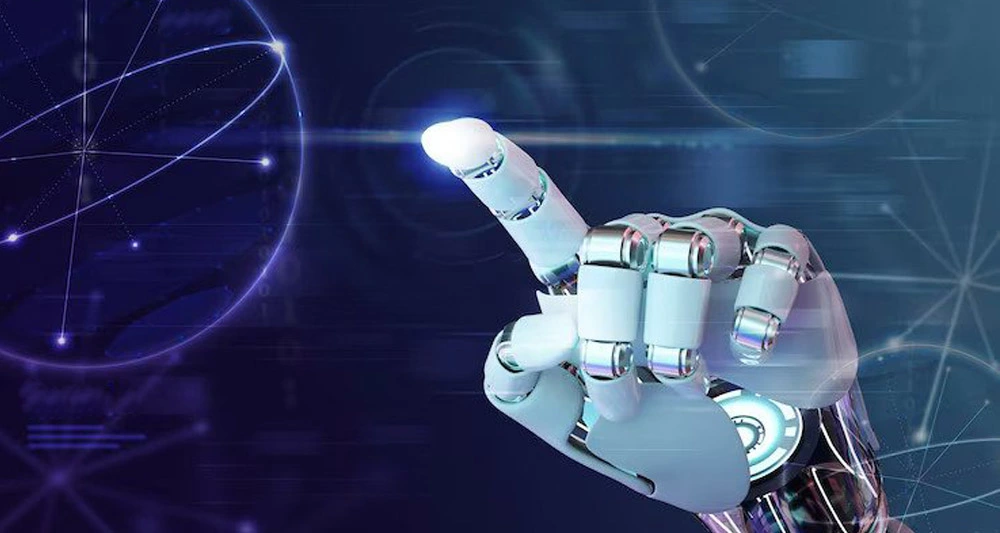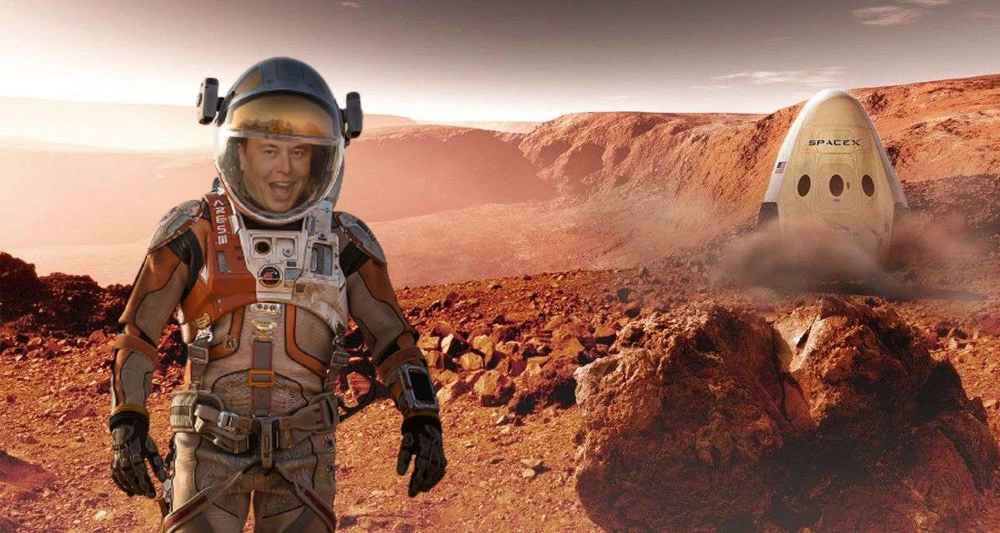Technology is developing at an incredible rate in today’s fast-paced world, changing how we connect, live, and work. There are a number of new technologies that are in development that have the potential to completely transform the way we live in the future. These technologies, which range from blockchain and quantum computing to artificial intelligence and robotics, may alter the way we approach a variety of facets of our life, including healthcare, banking, and even space exploration. In this essay, we will examine the most significant technology of the future and talk about how it might affect civilization.
Artificial Intelligence (AI)

Artificial intelligence (AI) has the potential to drastically change almost every industry and facet of our life, making it one of the most promising technologies of the future. The creation of intelligent computers capable of doing activities that traditionally require human intelligence, such as speech recognition, decision-making, and language translation, is known as artificial intelligence (AI).
What is AI?
The term artificial intelligence (AI) describes the creation of computer systems that are capable of doing activities that typically require human intelligence, such as speech recognition, visual perception, decision-making, and language translation. The creation of algorithms and models for artificial intelligence (AI) enables machines to learn from data and continuously improve their performance without being given explicit instructions.
Applications of AI
Healthcare, banking, transportation, and education are just a few of the many domains where AI has applicability. AI has the potential to advance drug development, personalised medicine, and illness detection and therapy. Artificial intelligence (AI) in finance can be used to spot fraud, streamline customer support, and enhance investment choices. AI has the potential to improve traffic flow, increase vehicle safety, and decrease accidents in the transportation sector. AI in education can be used to tailor students’ educational experiences and give them immediate feedback.
Future of AI
AI has a promising future and has the power to fundamentally alter every area of our life. According to some scientists, AI will eventually surpass human intelligence and take the lead as the most powerful force on earth. However, there are also worries about the dangers and difficulties brought on by AI, such as the possibility for AI to be used for evil, and the requirement for moral standards and laws.
Robotics

Robotics is a technology that is fast developing and has the potential to drastically alter many facets of our life. The creation of devices that can complete tasks autonomously and with little assistance from humans is at the heart of robotics. Robotics is a broad field that includes a variety of technologies, from straightforward mechanical devices to highly developed, conversational robots.
Applications of Robotics
Manufacturing, healthcare, agriculture, transportation, and entertainment are just a few of the industries where robotics has a wide range of uses. Robots are employed in production to automate monotonous jobs, boost productivity, and cut costs. Robots can be employed in the healthcare industry to assist with surgery, monitor patients, and do physical rehabilitation. Robots in agriculture can assist with chores including harvesting, sowing, and fertilising crops. Robots can be utilised in the transportation industry to help with jobs like cargo handling and vehicle maintenance. Robots can be utilised to produce immersive experiences in the entertainment industry, such as rides at theme parks.
Challenges Facing Robotics
Robotics faces a number of difficulties in spite of its potential advantages. Assuring the safety and dependability of robots is one of the main problems. For this, reliable control systems and efficient testing techniques must be created. Making sure robots are acceptable in society and don’t endanger people’s safety or wellbeing is another concern. This necessitates carefully taking into account moral and societal concerns, such as privacy, autonomy, and the effect of automation on the workforce.
Future of Robotics
Robotics’ upcoming developments are both intriguing and uncertain. On the one hand, robotics has the potential to significantly advance society by enhancing productivity, safety, and quality of life. Robotics, however, also brings up significant issues and worries about the place of technology in society and the effects of automation on the job market and the economy. It will be crucial to strike a balance between the potential advantages and the requirement for careful evaluation of the ethical, societal, and economic ramifications as the field of robotics continues to advance.
Blockchain

The distributed ledger technology known as “blockchain” has the power to drastically alter many facets of our life. A blockchain is, at its heart, a decentralised database that is kept up by a network of nodes rather than a single central authority. Compared to traditional databases, it is therefore more secure, transparent, and fraud-resistant.
How Blockchain Works
A blockchain is made up of a series of blocks, each of which has a certain set of transactions. Each block in the chain is connected to the one before it, producing a tamper-proof history of every transaction that has ever occurred on the network. The network’s nodes validate and process transactions, making ensuring they are valid and compliant with the network’s consensus rules using sophisticated algorithms.
Applications of Blockchain
Numerous industries, including finance, healthcare, supply chain management, and identity verification, have adopted blockchain technology in a variety of ways. Blockchain technology can be applied to the financial sector to develop safe, open, and effective payment systems as well as to make it easier to issue digital assets like cryptocurrency. Blockchain technology can be applied to the healthcare industry to safely store and exchange patient data while protecting patient privacy and data security. Blockchain technology can be used in supply chain management to monitor goods from their point of origin to their final destination, increasing efficiency and lowering fraud. Blockchain technology can be applied to identity verification to develop secure, decentralised identity systems that are impervious to fraud and identity theft.
Future of Blockchain
Blockchain technology has a promising but hazy future. Although blockchain technology has the potential to significantly advance society, it also brings up substantial issues that demand attention. It will be crucial to strike a balance between the potential advantages and the requirement for careful evaluation of the ethical, societal, and economic ramifications as technology continues to advance.
Quantum Computing

The field of technology known as quantum computing is developing quickly and has the potential to completely change how we process and analyse data. The foundation of quantum computing is quantum mechanics, which enables the development of computing devices that can carry out specific sorts of calculations far more quickly than conventional computers.
How Quantum Computing Works
Quantum bits, also known as qubits, are the fundamental components of quantum computers. Qubits are unlike conventional bits in that they can have a value of 0, 1, or a superposition of both 0 and 1. This enables parallel computation on quantum computers, which can significantly speed up certain sorts of problems.
Applications of Quantum Computing
Numerous potential uses for quantum computing exist, including drug discovery, simulation, optimisation, and cryptography. Many of the encryption techniques used to safeguard sensitive data can be cracked using quantum computing. Quantum computers can be used to replicate the behaviour of complicated molecules in drug discovery, assisting researchers in creating novel medications more swiftly and precisely. Quantum computers can be employed in optimisation to tackle challenging issues like route optimisation or portfolio optimisation. Quantum computers can simulate complex systems like weather patterns or chemical reactions.
Challenges Facing Quantum Computing
Quantum computing has drawbacks in addition to potential advantages. Noise is one of the main problems since it might cause calculations to be made incorrectly. Building and scaling quantum computers is a challenge as well since they require incredibly precise control and manipulation of individual atoms or subatomic particles. Furthermore, there is still a lot that is unclear about how quantum computing can affect current cryptography systems, which poses issues with security and privacy.
Future of Quantum Computing
Quantum computing has a bright future, but it is also unpredictable. Although quantum computing has the potential to have huge positive effects on society, it also raises substantial issues that need to be addressed. It will be crucial to strike a balance between the potential advantages and the requirement for careful evaluation of the ethical, societal, and economic ramifications as technology continues to advance.
Space Exploration

Humanity has long been attracted by space exploration. Our desire to explore the universe has led us to push the boundaries of our knowledge and capabilities, from the earliest days of rocketry to the present-day expeditions to Mars and beyond. As we continue to create new technology and increase our understanding of the cosmos, the future of space travel seems to be even more exciting. We must, however, take into account both the potential and difficulties that lie ahead as we look to the future.
The Future of Space Exploration: Opportunities
There are a lot of fascinating potential for space exploration in the future. Mars, which many scientists think was previously a livable planet, is one of the main areas of study. A number of missions have already been despatched to Mars, and more are scheduled to launch in the upcoming years. These missions will aid in our understanding of the planet’s geology and environment while looking for evidence of past or existing life.
The Future of Space Exploration: Challenges
The possibilities for space exploration are intriguing, but there are also many obstacles to be addressed. The expense of space exploration is a significant obstacle. It can be challenging to justify the cost of sending probes to other planets and creating new technologies when there are so many issues on Earth that need to be solved.
5G Technology

The use of smartphones and other wireless devices has increased at a never-before-seen rate in recent years. As a result, there is a higher need for wireless communication technologies that are quicker and more dependable. This is where 5G technology, the fifth generation of wireless networking technology, enters the picture. It has the potential to completely transform the way we communicate, work, and live.
What is 5G technology?
In comparison to 4G, 5G technology offers quicker and more reliable wireless connectivity. It is the fifth generation of wireless networking technology. It can send more data more quickly since it runs on a higher frequency spectrum. With the help of this technology, connections should be more dependable, with lower latency and better download and upload rates.
How does 5G technology work?
The high-frequency band used by 5G technology allows it to transfer more data more quickly than 4G. It makes use of a technique known as beamforming, which focuses the wireless signal on the user’s device rather than distributing it everywhere. As a result, signal interference is decreased and data transfer speeds are increased.
Future of 5G technology
The development of 5G technology has the potential to completely alter how we communicate, work, and live. It will make it possible to create innovative products and services like self-driving cars, online medical consultations, and smart homes. Additionally, it will open the door for the development of fresh business plans and sectors like the Internet of Things and smart cities.
Final Thoughts
There are undoubtedly several significant technologies that will influence how our planet develops in the future. Each of these technologies, including artificial intelligence (AI) and robotics, blockchain, quantum computing, and space exploration, has the potential to fundamentally alter the way we live, work, and interact with one another. Since each one has particular advantages and uses, it is challenging to determine which is the most crucial.
